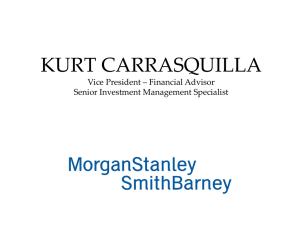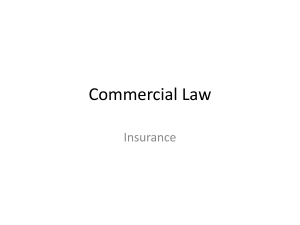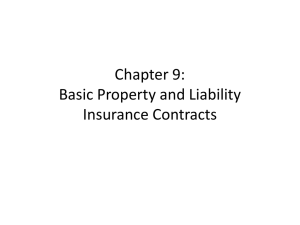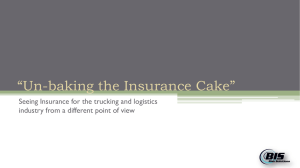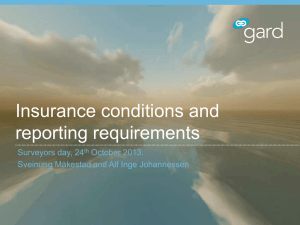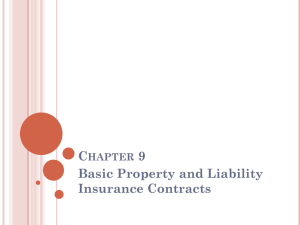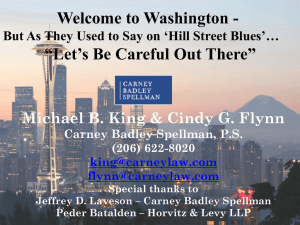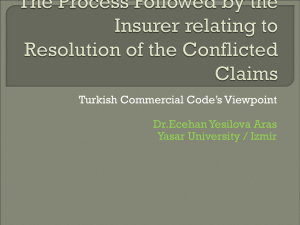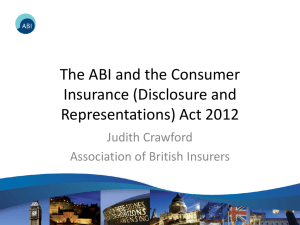HNW Insurer - CCV Jersey
advertisement
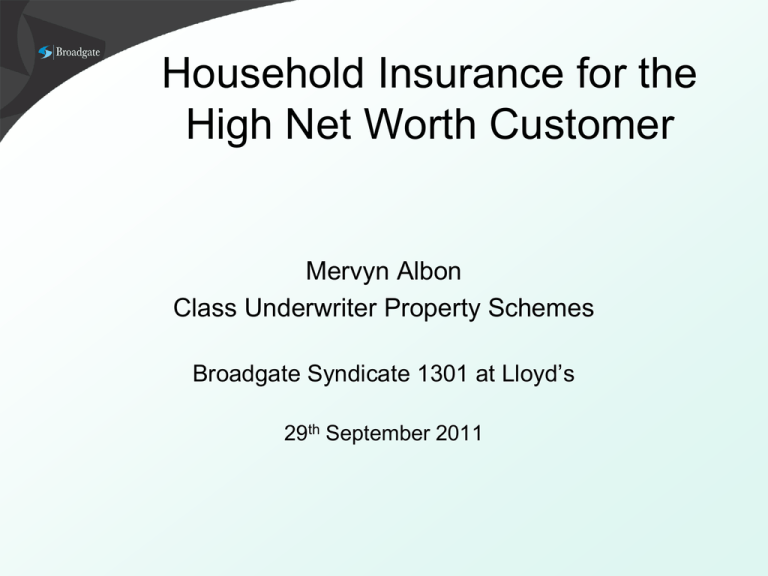
Household Insurance for the High Net Worth Customer Mervyn Albon Class Underwriter Property Schemes Broadgate Syndicate 1301 at Lloyd’s 29th September 2011 High Net Worth vs. Standard Insurer – An Overview of the Insurance Market • The high net worth (HNW) market has evolved in the UK over the past 20 years • Now there is a good choice of insurers for the HNW individual to choose from • There is still a high proportion of HNW customers who insure with “household name” companies purchasing a standard type of insurance policy • Lack of customer & insurance agent education and awareness of specialised products available The Key Differences – HNW vs. Standard • The ease of reading and understanding • The core coverage provided • How a claim is paid – the basis of settlement • Specialised coverage extensions • Warranties and conditions – the “small print” • Value added services Know ye that we the underwriters ... • HNW policies should be in clear and easy to understand plain English • A customer should know what is, and what is not covered • Defined words – the meaning of language used in the policy • Lack of ambiguity for customers and underwriters entering into an insurance contract Warranties & Conditions – the “small print” • Standard policies often carry “conditions precedent to the liability of underwriters”. These may include: – Average – Protection and alarm/safe warranties – Item specific clauses such as “clasp and settings” or “onus of proof of value” • A HNW policy should be warranty free. This is based on trust and the understanding of a HNW customer’s lifestyle, however some risks do need special terms • For a HNW underwriter, the best customer is: • Rich • Honest • Careful What is “Average” • Average is a method used by insurers to protect themselves against under insurance – If a property is insured for less than the actual reinstatement/replacement value of the item(s) then underwriters do not receive the correct premium for the risk – An under-insured claim is therefore subject to proportional settlement – Most insurers use 20% under-insurance as a trigger point before applying Average Core coverage – All Risks Vs. Perils • “Peril” – “a cause or pain, or injury, or loss” • Peril based policies are still purchased. Typically covering the perils of: – Fire, lightning, explosion, aircraft/vehicles/animals, storm, flood, weight of snow, escape of water/oil, theft, riot, subsidence, heave and landslip – Accidental damage option for an increased premium – Contents only covered within the home unless an additional premium paid; sum insured limited • “All Risks” – “all risks of physical damage or physical loss” – HNW policies will cover contents etc. on a world wide basis Buildings Insurance – Standard Insurer: reinstatement of the property • Subject to “average” – HNW Insurer: reinstatement of the property. • Not subject to “average” • Extended reinstatement available after property surveyed by insurer Buildings Insurance cont. • HNW policies give full reinstatement cover with no “average” condition for under insurance • Cost of alternative accommodation/loss rent – mostly unlimited in monetary terms and given for 12+ months • “Trace & Access” cover • Replacement locks – most HNW policies have no limit or deductibles • New acquisitions; some HNW policies give automatic coverage for newly purchased properties Contents Insurance • HNW policies generally give worldwide all risks coverage • “New for old” coverage • No deduction for every day wear and tear on clothing and other items; a standard policy will pay a claim with a deduction for depreciation • A HNW policy will give generous sub limits for higher risk items such as precious metals and jewellery • New acquisitions are often covered automatically, subject to a pre-determined limit Fine Art, Antiques, Collectibles & Valuables Insurance • Standard insurers do not provide an adequate basis of settlement and often shy away from high value items • HNW insurers cover the items based on their current market value • It is possible to insure items on an “agreed value” basis • Depreciation cover is often given for “partial” losses • Acquisition cover • “Pairs & Sets” - if an item(s) has an increased value because it is part of a pair or set then HNW insurers can take this into account if one item is lost or destroyed • Some HNW policies cover an item whilst at a restorers • Defective Title insurance Personal & Employers Liability Cover • Standard insurers give fairly low limits • HNW policies give worldwide personal liability coverage (with some time restrictions for North America) • Libel and slander cover available • Domestic employees cover given Additional added benefits • Free personal risk appraisal – ensuring correct sums insured and offering risk management advice • Legal expenses coverage with higher limits than a standard insurer • Home emergency coverage • Annual family travel insurance – better coverage than offered by standard travel insurers • Identity Theft cover • Some HNW insurers allow you to insure motor vehicles under the same policy Some examples ... Average • The Round House, Belle Isle • Grade I listed C17 residence • Badly damaged by fire in 1996 • Under insured by around £6.5m – HNW insurer guaranteed the rebuild – A standard policy would not have responded Some examples ... Trace & Access … – Leaking under floor pipe – Standard Insurer: • Limited trace cover • Partial replacement • Not suitable for the HNW customer – HNW coverage: • Damage caused finding leak • Replacement of whole suite Some examples ... Agreed Value • • Wedding ring made for HNW customer Item stolen from hotel room – Standard Insurer • May decline claim in unattended hotel room • Would seek to use own replacement jewellers • May not agree the insured value – HNW Insurer • Based on valuation agreed value cover given • HNW insurer paid loss as a cash settlement • Customer had new ring made

